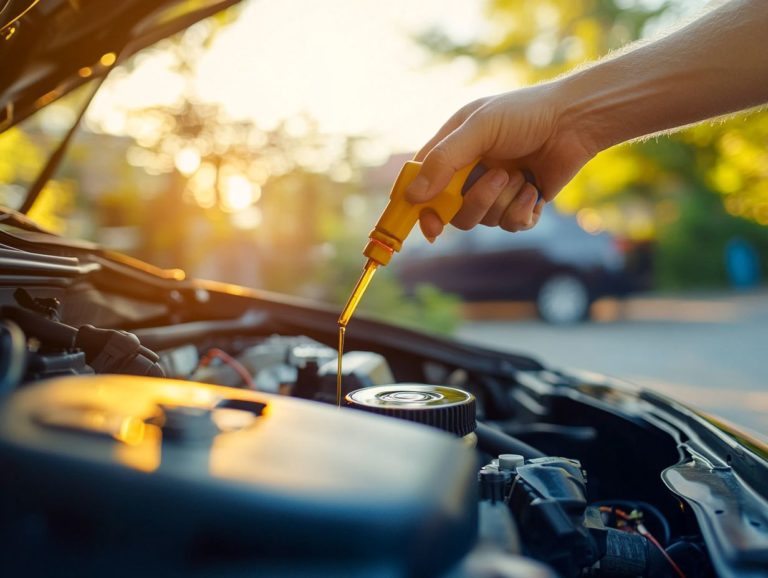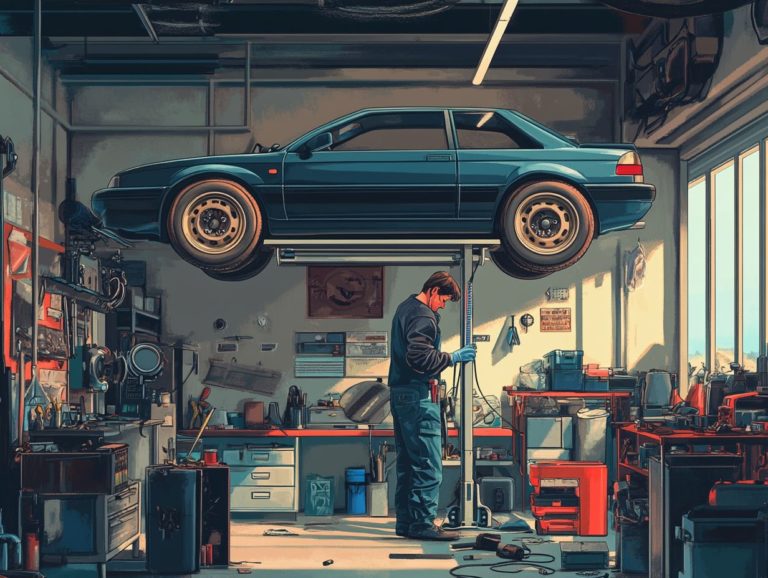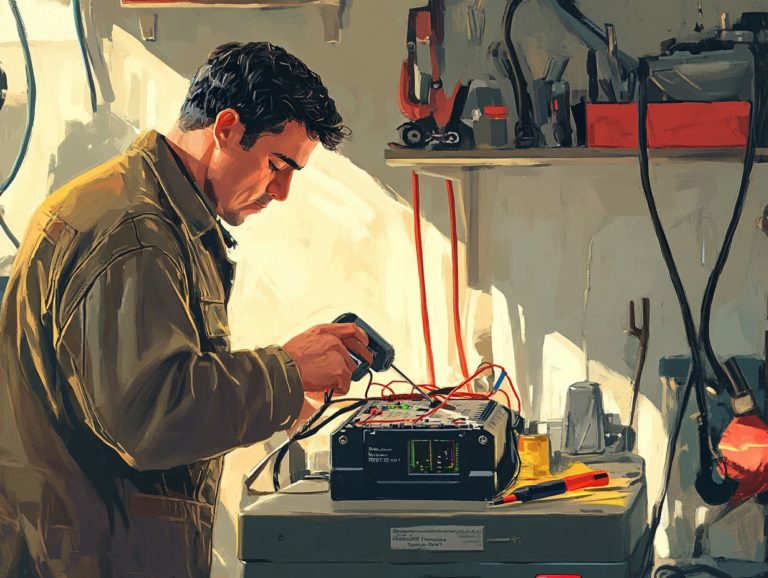What Are the Benefits of Regular Vehicle Inspections?
Don’t risk your safety! Regular vehicle inspections are key to keeping your car reliable on the road and can significantly enhance your vehicle’s performance.
This article delves into the myriad benefits these inspections offer, ranging from improved safety to long-term cost savings. You ll learn how often to schedule an inspection, what to expect during the process, and how to prepare effectively.
Moreover, it emphasizes common car problems that inspections can uncover, allowing you to keep your vehicle in peak condition. Discover why prioritizing your vehicle s health is not just wise but essential for every driver.
Contents
- Key Takeaways:
- The Importance of Regular Vehicle Inspections
- Benefits of Regular Vehicle Inspections
- How Often Should You Get Your Vehicle Inspected?
- What Happens During a Vehicle Inspection?
- How to Prepare for a Vehicle Inspection
- Common Issues Found During Vehicle Inspections
- Frequently Asked Questions
- What Are the Benefits of Regular Vehicle Inspections?
- Why should I get my vehicle inspected regularly?
- What are some common issues that can be identified during a vehicle inspection?
- How often should I get my vehicle inspected?
- Will regular vehicle inspections help maintain the value of my car?
- Can regular vehicle inspections help me save money?
Key Takeaways:
- Regular vehicle inspections improve safety and performance, preventing potential accidents and breakdowns.
- Long-term cost savings can be achieved through regular inspections, as any car problems can be caught and addressed before they become more expensive to fix.
- It is recommended to get your vehicle inspected at least once a year, or more frequently for older or high-mileage vehicles.
The Importance of Regular Vehicle Inspections
Regular vehicle inspections are essential for ensuring the safety and reliability of your vehicle. These inspections help you spot potential car problems that could lead to accidents or hefty repair bills.
By following safety regulations and committing to regular inspections, you can enhance your vehicle’s performance, extend its lifespan, and ensure compliance with local laws. Being proactive with regular check-ups boosts fuel efficiency and elevates customer satisfaction for anyone using your vehicle.
Ultimately, regular vehicle inspections are a fundamental aspect of responsible vehicle ownership, protecting both you as the driver and other road users.
Why Vehicle Inspections Matter
Vehicle inspections enhance driver safety and help avert accidents stemming from mechanical failures.
By catching potential issues before they develop into serious problems, regular vehicle checks serve as a vital safeguard against unexpected breakdowns while you’re on the road. These inspections ensure that your vehicle complies with safety regulations developed to protect not just you, but also your passengers and pedestrians.
Maintaining optimal vehicle performance through scheduled inspections plays a crucial role in the overall efficiency and longevity of your vehicle. Consequently, adhering to these inspections reduces risks and provides peace of mind for everyone involved in the journey.
Benefits of Regular Vehicle Inspections
Regular vehicle inspections offer a wealth of benefits that enhance both safety and financial savings for you as a vehicle owner. These advantages encompass improved safety measures, better vehicle performance, and potential long-term cost savings.
By pinpointing car problems early on, you can avoid costly repairs and stay in line with safety regulations. Consistent inspections boost your fuel efficiency, which ultimately translates to reduced maintenance costs and lower insurance premiums.
Improved Safety and Performance
Regular vehicle inspections ensure that critical components like brakes and tires are in optimal condition. These evaluations involve meticulous checks of the brake system, including inspecting brake pads, rotors, and fluid levels to prevent any potential malfunctions.
Assessing tire condition means examining tread depth the grooves in your tires that affect grip and inflation, essential for maintaining traction and stability on the road. Inspections also cover the functionality of crucial safety equipment, such as seatbelts and airbags, ensuring they are primed and ready for action in emergencies.
Regular inspections tackle potential issues head-on, instilling driver confidence and allowing you to hit the road knowing your vehicle is safe and reliable for every journey.
Cost Savings in the Long Run
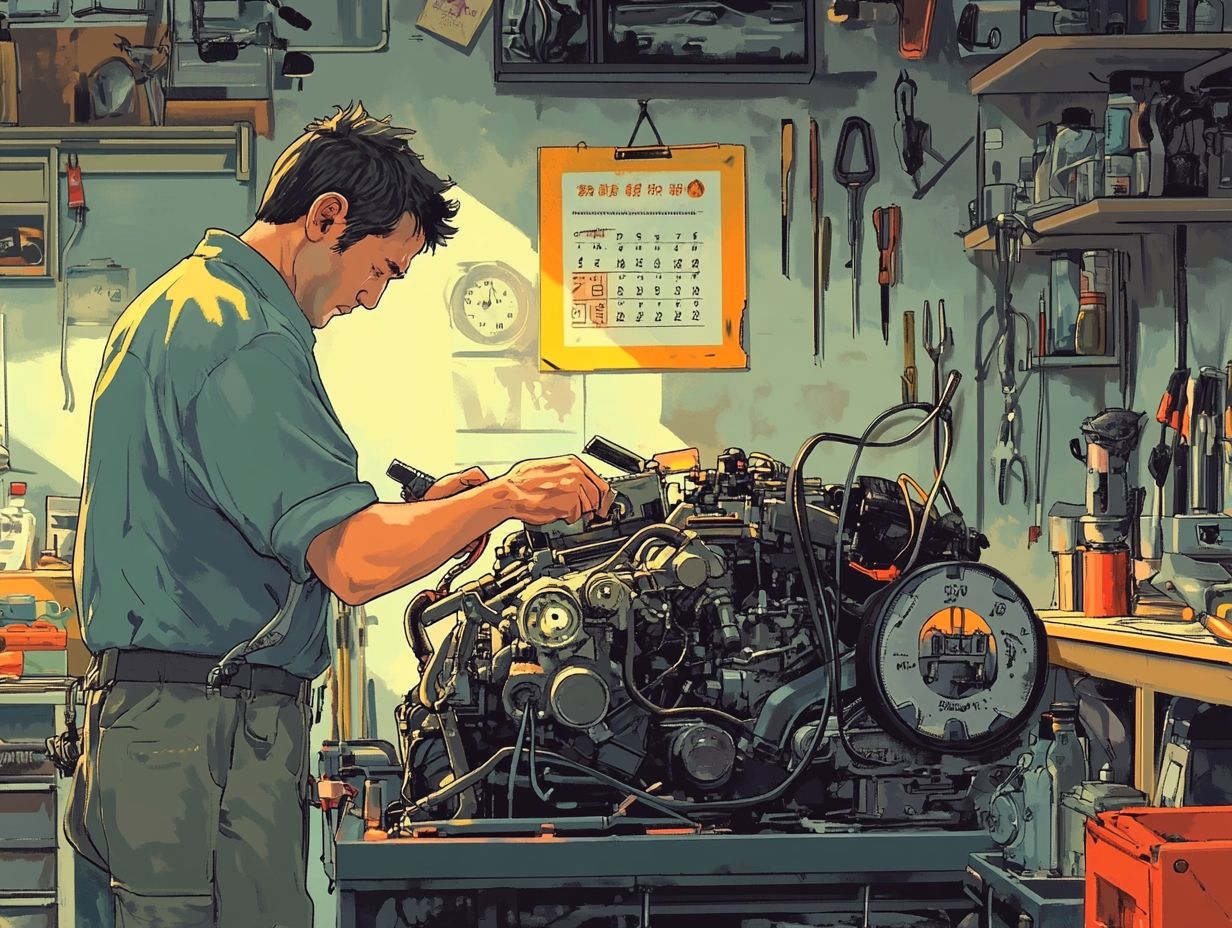
Regular vehicle inspections can lead to substantial cost savings over time by identifying issues before they develop into major repairs.
Neglecting timely inspections often results in unexpected failures that can lead to hefty repair bills. You’d certainly prefer to avoid such expenses.
Take, for example, a minor oil leak that goes unnoticed during a routine check; it could eventually escalate into severe engine damage, necessitating costly replacements.
By committing to regular maintenance, you not only keep your vehicle operating smoothly but also enhance the longevity of your investment. Routine tasks like brake checks, tire rotations, and fluid level assessments can significantly reduce overall maintenance costs. This allows you to save money while ensuring your vehicle remains in excellent shape, providing safe and reliable transportation.
How Often Should You Get Your Vehicle Inspected?
Determining how often you should get your vehicle inspected is essential for ensuring both safety and following local rules.
Generally, it’s advisable to have your vehicle inspected at least once a year. However, various factors including the type of vehicle, how you use it, and state regulations might necessitate more frequent inspections. For example, commercial vehicles often require more regular checks to meet established safety standards.
By following the recommended inspection frequency, you can significantly reduce the risks of accidents and the potential for costly repairs down the line.
Recommended Frequency
The recommended frequency for vehicle inspections often varies by state and vehicle type. As a general rule, aim for at least once a year for standard vehicles.
In some states, inspections are required every six months for commercial trucks or buses due to the increased safety risks these larger vehicles pose when transporting passengers or goods.
Specialty vehicles, like motorcycles or classic cars, come with their own unique inspection requirements, tailored to their specific safety needs and performance characteristics. By following these recommendations, you enhance the safety of your vehicle and ensure compliance with local regulations.
What Happens During a Vehicle Inspection?
During a vehicle inspection, certified technicians perform a careful check of numerous components to determine the vehicle’s ability to be safely driven on the road.
Inspection Process and Checklist
The inspection process requires a step-by-step process, guided by a comprehensive checklist that ensures every critical vehicle system is evaluated for safety and meeting safety rules.
This checklist is essential, detailing specific components that you must scrutinize, such as brakes, tires, lights, and fluid levels. By adhering to these meticulous steps, you can pinpoint potential issues and assess the vehicle’s overall performance.
A thorough examination of these elements is paramount for preventing accidents and minimizing future repair costs. Using such a checklist enables you to uphold industry standards and regulations, ultimately enhancing the safety and reliability of the vehicle for both you and other road users.
How to Prepare for a Vehicle Inspection
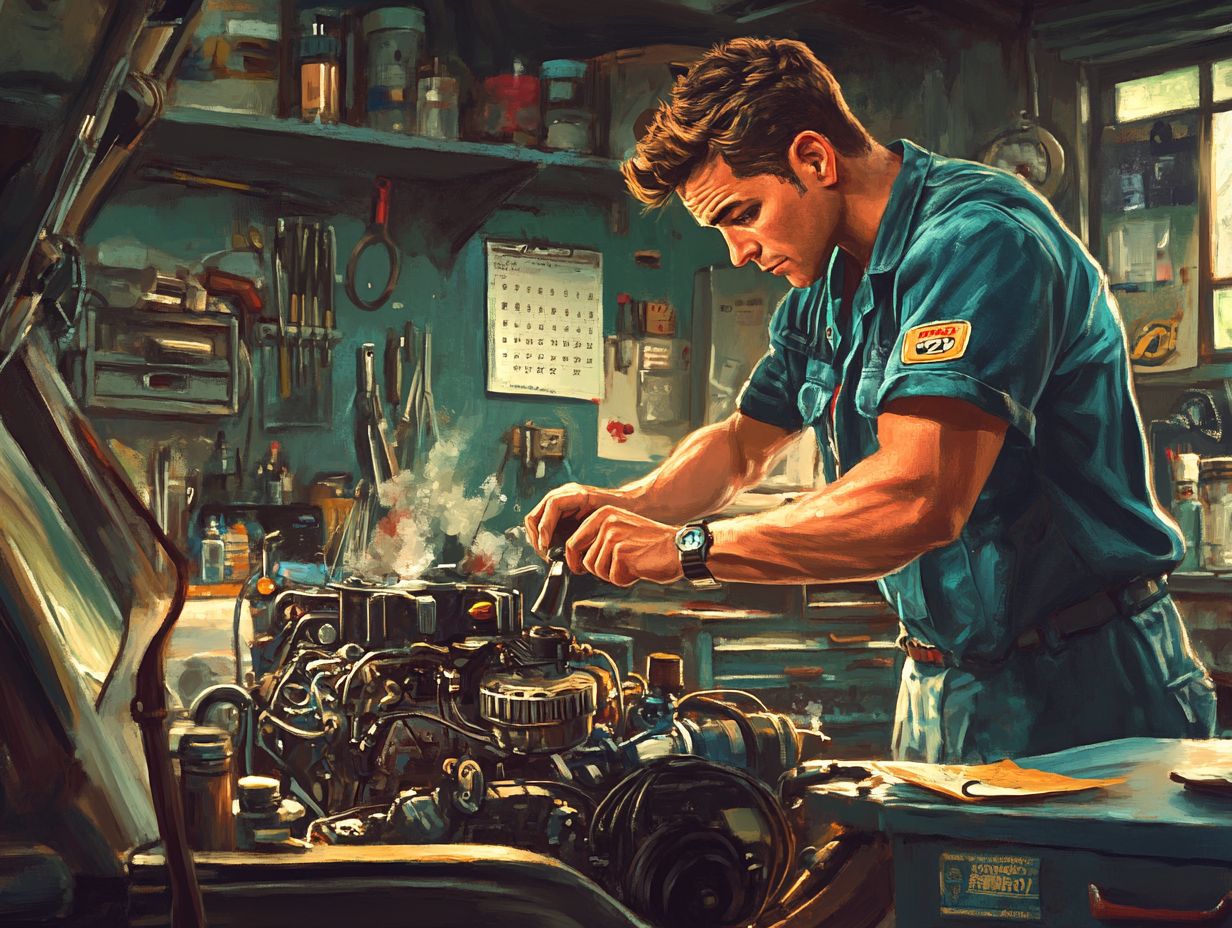
Preparing for a vehicle inspection is crucial for ensuring a seamless and efficient inspection. By taking the time to address potential issues in advance, you set yourself up for success and minimize any unexpected hiccups during the inspection process.
Stay ahead of potential issues! Get your vehicle ready today and enjoy peace of mind on the road!
Steps to Take Before Your Inspection
Before your vehicle inspection, it s essential to take a few key steps to ensure your car is ready and meets all requirements.
Start by giving those tires a thorough once-over. Look for uneven wear or low tread depth. These factors can significantly impact both performance and safety.
Next, pay attention to the brakes. Make sure they respond smoothly and without any odd noises. Your safety depends on it!
Check all fluid levels, including oil, coolant, and brake fluid. Low levels can lead to unexpected breakdowns and failures during inspection, which is the last thing you want.
Don t wait! Tackling minor repairs like fixing that cracked windshield or replacing worn-out wipers can make all the difference. This simple step can help you breeze through the inspection!
Common Issues Found During Vehicle Inspections
During vehicle inspections, you may encounter a range of common issues, from minor concerns to significant malfunctions that could impact both safety and performance.
Identifying and Addressing Common Problems
Identifying and addressing common vehicle malfunctions during inspections is essential for preventing inspection failures and ensuring your vehicle s safety.
Many owners often overlook issues like worn brake pads or low fluid levels. Regular checks can uncover these minor concerns before they snowball into significant repairs.
For example, replacing brake pads promptly not only ensures optimal stopping power but also protects your rotors from damage, which can be much costlier to repair.
By prioritizing timely maintenance, you extend the lifespan of your vehicle and significantly reduce repair expenses over time.
Stay proactive to enjoy peace of mind and a more reliable driving experience.
Frequently Asked Questions
Here are some common questions about vehicle inspections.
What Are the Benefits of Regular Vehicle Inspections?
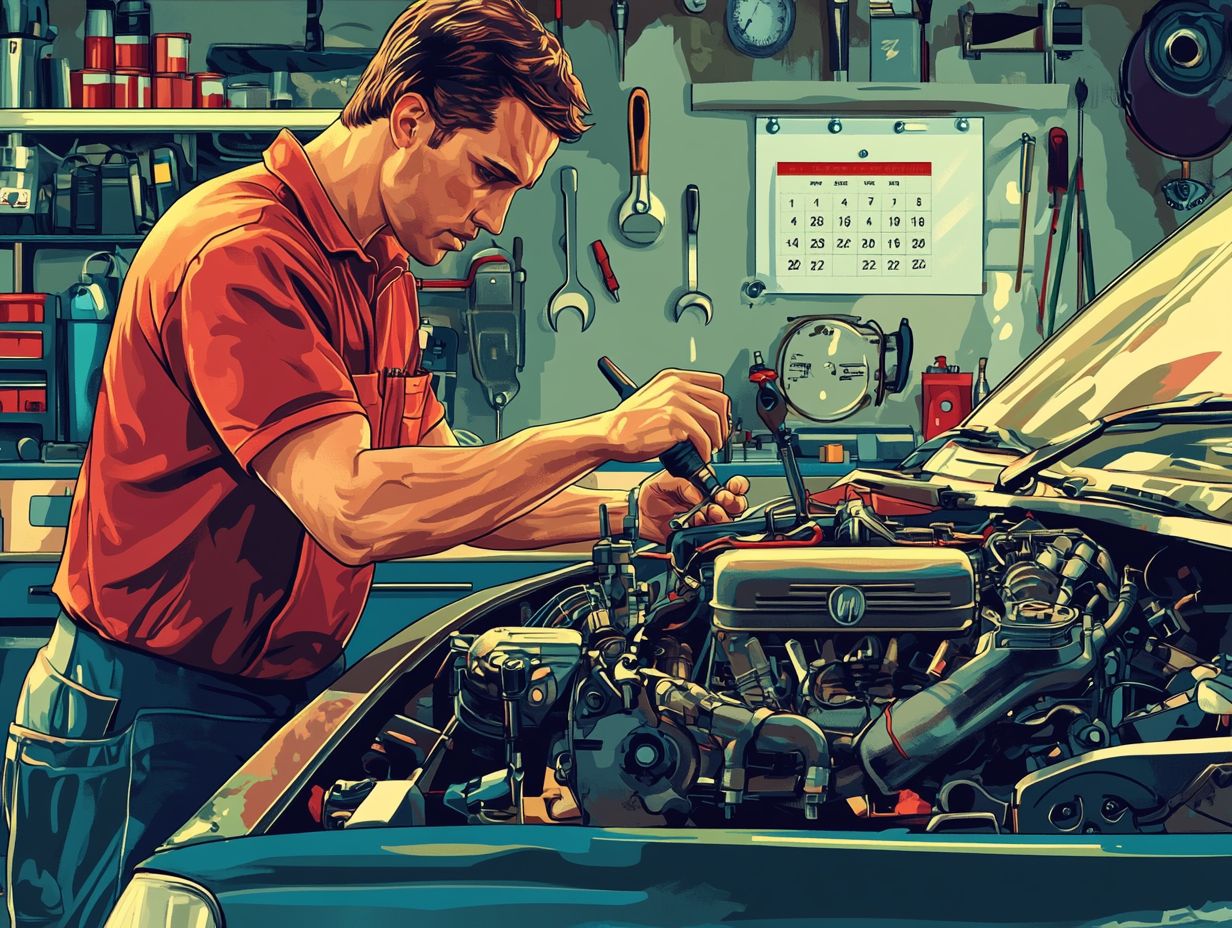
Regular vehicle inspections can help identify potential issues before they become major problems, saving you time and money in the long run.
Why should I get my vehicle inspected regularly?
Regular vehicle inspections help ensure that your car is safe to drive and in good working condition, reducing the risk of accidents and breakdowns.
What are some common issues that can be identified during a vehicle inspection?
During a vehicle inspection, common issues such as worn tires, faulty brakes, and engine problems can be identified and addressed before they cause further damage.
How often should I get my vehicle inspected?
This can vary depending on your location and type of vehicle, but it is generally recommended to have your car inspected at least once a year or every 10,000 miles.
Will regular vehicle inspections help maintain the value of my car?
Yes, regular vehicle inspections can help maintain your car’s value by ensuring it is in good condition and addressing any potential issues before they become bigger problems.
Can regular vehicle inspections help me save money?
Yes! By identifying and fixing issues early on, regular vehicle inspections can help you save money on costly repairs and potential breakdowns in the future.


